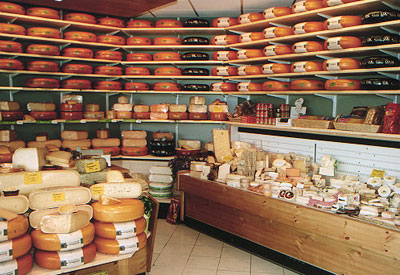|
1.1 Pronunciation
The rules for the pronunciation of Dutch are very consistent and easy to learn. Pronunciation is a distinctive and therefore essential component of a language. It is in the interest of the student's progress that the following characteristic sounds of Dutch be learned thoroughly. For pronunciation, more than any other element of the language, the rule that practice makes perfect holds true. The following sounds are different or unknown in English but quite common in Dutch.
A B C D E F G H I J K L M N O P Q R S T U V W X Y Z

1.2 Vowel
sounds
1. a- (short a-: between
duck and dock). The a- is found in words such as
pak (parcel, suit), and plat (flat).

Exercise 1. Practice
the a- sound in the following words by reading them aloud:
plat, kranten, dag, zakken, pak, vast, wal, klap, ratten, gat.
|
|
2. aa- (long aa-: not found in
English at all. It

is produced by shaping the mouth for the vowel
sound in the English words by, why, etc. but opening the mouth much wider). It is found in Dutch words such as: kaas (cheese)
and gaan (to go) and also in open syllables, i.e. in
syllables ending on a vowel, as in maken (to make) and
praten (to talk).

Exercise 2. Read the
following words aloud: kraal, ramen, aap, daar, platen, vaak, kaal,
bazen, ja, amen.
|
Note i: There is en essential difference in meaning between such words as plat (flat) and plaat (picture, record), mak (tame)
and maak (to make), etc. This difference is determined
by the difference between the short and the long a- sounds. It
is therefore very important to distinguish clearly between these
sounds. Mispronunciation may, in may cases, lead to serious
misunderstandings. Here are a few more examples: tak is
branch in English, but taak means task; man
has the same meaning as man in English but maan means
moon.
Note ii: The plural of tak (branch) is takken (branches); this means that
the consonant has to be doubled, otherwise we get taken (tasks),
the plural of taak (tasks). This doubling of consonants
after short vowel sounds constitutes a rule which applies to most
words spelled like tak-takken, for example to lap-lappen
(rag-rags) and zak-zakken (bag-bags).
Note iii: The a- sound in tak-takken, etc. is "short" because they are single and followed, in the same syllable, by a consonant (t, s, k, n,
etc.). The plural in Dutch is generally formed by adding -en as
in the examples above.
If the last syllable of a word is not stretched, the plural is often formed by adding an -s, as in English: thus the plural of tafel (table) is tafels.
The plural of raam (window) is ramen (windows).
The last word consists of two syllables: ra- and -men.
The second a- is dropped because the a- is the last
letter of the syllable. If the last letter of a syllable is a vowel,
we say that that syllable is open: ra- is thus an open syllable
and the single a- is pronounced like an aa- (the long
aa-). There are, in other words two ways in which a long vowel
sound can be formed: by doubling the vowel concerned, eg., aa-
as in kaas or having it at the end of a syllable, as in
ramen.
To determine the number of syllables that
make up a given Dutch word, it is best to pronounce it slowly: ra-men.
Again, if the last letter of a syllable is a vowel, such as an a-,
this vowel is pronounced as though there were two a's: raa-men.
This spelling (i.e. with two a's and a hyphen) is not normal
and is here only used to indicate that the word concerned consists of
more than one syllable. Words like praten (to talk),
betalen (to pay), gapen (to yawn) and
halen (to fetch) also contain open syllables (pra-ten,
be-ta-len, ga-pen, ha-len).
Exercise 3. Break the
following words up into syllables: maken, vallen, hakken, raken,
harken, slapen, dalen, kamer.
æ
(ma-ken, val-len, hak-ken, ra-ken, sla-pen, ka-mer)
3. o- (short o-: more or less
as in English more, for, etc. but quite short). It is
found in Dutch words such as bos (woods) and kop
(head of an animal).
Exercise 4. Read
the following words aloud: rond, los, toch, vossen, kost, lokken, vol,
op, bronnen. 
|
|
4. oo- (long oo-: as in English
go and low but without the glide towards w). It is found in Dutch words such as groot (big, large) and rood (red).
Exercise 5. Read the following words aloud: knoop, vroom, roos, kroon, boos, droog, hoofd.

|
Note iv: As in the case of the Klik op A of B om te kiezen.-, o- is pronounced oo- if the syllable in which it appears is open, such as in bomen. If this word is split into two syllables, we get bo-men. This word is therefore pronounced boo-men, but may not be spelled this way. We find this situation in words like wonen (to live), dozen
(boxes), symbolen (symbols), probleem (problem), and over (over). (do-zen, sym-bo-len, pro-bleem, o-ver).
Exercise 6. Break the following words up into syllables:
kloppen (to knock),
kopen (to buy), sloten (locks, ditches),
doden (to kill), volgen (to follow),
roken (to smoke) and stoppen (to stop).
æ klop-pen, ko-pen, slo-ten, do-den,
vol-gen
5. e- (short e-: more or less like the sound in English set, crest, etc. but somewhat rounder, approaching the a- in English sat, etc.) It is
found in Dutch words such as mes (knife) and kerk (church).
Exercise 7. Read the following words aloud: gek, lekker, best, vet, wetten, sterk, vertellen, bek, erg, ontdekken.

|
|
6. ee- (long ee-: more or less like the English ay- as in say, crazy, etc. but without the glide towards i). It is found in Dutch words such
as veel (much, many) and steen (stone, brick).
If e- is in an open syllable, as in stegen (ste-gen),
the word is pronounced stee-gen, but never spelled that way.
This is also the situation in words like breken (to break),
weten (to know), vergeten (to forget) and
spelen (to play).
Exercise 8. Break the following words up into syllables:
geven (to give),
lekker (nice),
eten (to eat),
vreten (to eat like an animal),
kerken (churches),
kennen (to know a person or to know as a result of having studied it)
weten (to know a fact or because you were told).
|
Note v: The explanation of the difference in pronunciation of e- and ee- only applies to words in which these sounds receive the stress. If the e- sound is unstressed, such as in words like lopen (to walk),
bedanken (to thank) and also in de (the), the e- is pronounced as in similar words in English, such as father, paper, etc.
7. u- (short u-: heard in English words like bird, sir and fur). It is
found in Dutch words such as bus (bus) and krul (curl).
Exercise 9. Read the following words aloud:
stuk, knul, nummer, juk, lucht.

|
|
8. uu- (long uu-: this sound is completely unknown in English. It is produced by shaping the lips as for the English sounds under
7 or the Dutch ee and then pouting the lips as though you were
going to whistle or kiss). It is found in Dutch words such as vuur
(fire) and muur (brick wall). |
Exercise 10. Read the following words aloud: minuut, schuren, duur, gruwel, puur, ruzie, muziek, stuur.
Note vi: If the u- appears at the end of a syllable, it is pronounced like uu-. This is the case in words like muren (walls),
avonturen (adventures), evalueren (to evaluate),
rumoer (noise) and vuren (fires).

Exercise 11. Break the following words up into syllables: muziek, vlugger, puur, rust, turen, lucht, vluchten, rusten, Welterusten.
æ mu-ziek, vlug-ger, puur, rust,
tu-ren, vluch-ten, rus-ten, wel-te-rus-ten
9. i- (short i-: similar to the
English i in sit and this). It is found in Dutch
words like zitten (to sit) and blik (tin can).
Exercise 12. Read the following words aloud: ik, klimmen, flink, binnen, in, vinden, zingen,
kring.

|
Sometimes the i- is long (as in -ie below). We find this in words like radio, idee, and kritiek.
10. ie- (long ie-: heard in English words like seen and green but not stretched). It is found in Dutch words such as lied (song) and
vriend (friend).

Exercise 13. Read the following words aloud: dier, vies, hier, plezier, zien, vier, drie, niet.
|
Note vii: i- does not have a long variant: i- and ie- are, in fact, two practically unrelated sounds.
11. eu-: This is a special vowel as it consists of two letters but comprises only one sound. It is unknown in English. It is formed by shaping the lips and tongue for the oo- sound after which the tongue is lowered and pulled back somewhat.
It appears in Dutch words such as neus (nose) and
keuken (kitchen).

Exercise 14. Read the following words aloud: reus, leuk, heus, beukeboom, keuze.
 |
| |
12. oe-: This sound is comparable to
the vowel sound in English words such as dew, do and
two. It is found in the Dutch words vroeg (early)
and toen (then - past tense). |
Exercise 15. Read the following words aloud: voelen, voet, boek, moeten, bloed.
Exercise 16. Read the following words aloud: 
- mat, maken, praten, krant, plaat, zak,
betalen, kraal, kaas, rat, gapen, kat, gaan, vaak, baas.
- bos, boos, wonen, rood, los, vol, roos,
open, roken, stoppen, sloten, doden, kloppen, probleem, volgen,
boom.
- veel, kerk, lekker, best, weten, gek,
vergeten, mes, been, kennen, tegen, breken.
- stuk, vuren, vlug, duur, muziek,
rusten, rumoer, vluchten, lucht.
- binnen, kring, vinden, zingen, in.
- vriend, drie, vies, vier, dier, zien,
hier, lied.
- heus, neus, keuken, beuk, keuze.
- doen, voet, bloed, moeten, boek.
a.
mat, ma-ken, pra-ten, krant, plaat, zak, be-ta-len, kraal, kaas,
rat, ga-pen, kat, gaan, vaak, baasb. bos, boos, wo-nen, rood, los, vol, roos, o-pen, ro-ken,
stop-pen, slo-ten, do-den, klop-pen, pro-bleem, vol-genc. veel, kerk, lek-ker, best, we-ten, gek, ver-ge-ten, mes,
been, ken-nen, t e-gen, bre-kend. stuk, vu-ren, vlug, duur, mu-ziek, rus-ten, ru-moer,
vluch-ten, luchte. bin-nen, kring, vin-den, zing-en, in
1.3
Diphthongs and double vowels:
1. ei-/ij-: There is no difference between the
pronunciation nor between the functions of these two symbols. The
sound resembles the ay- sound in the English words say
and take, including the i- sound at the end but shorter.
The meaning of the Dutch words rijst (rice) and reist
(the verb travels) can, in spoken form, only be determined by
the context in which the words appear.
Exercise 17. Read the following words aloud: mij, mei, jij, wij, krijgen, dreigen, slijten, zeilen, blijven, slijterij, klein. 
|
| |
2. au-/ou-: As with ei-/ij-,
there is no difference between au- and ou- except in the
spelling, and in this case not even in the meaning. The spelling can
only be explained historically. The sounds appear in Dutch words such as gauw (quickly) and goud (gold) and is
comparable to the vowel sound in the English word now.
Exercise 18. Read the following words aloud: mouw, dauw, verkouden, vrouw, hout, zout, flauw.

|
|
3. ui-: This is apparently one of the
most difficult sounds to produce for English speaking persons. It is
formed lower in the mouth and by rounding the lips a little less than
for the uu-. The sound produced is between the ou- and
the eu-. It is found in the Dutch words huis (house)
and vuil (dirty).
Exercise 19. Read the following words aloud: ui, fluiten, tuin, gebruiken, kruis, besluiten,
stuiten, uit, vuist. 
|
Note viii: Diphthongs have no
long and short forms. There is therefore no doubling of either vowels
or consonants if the stem of a given word contains a diphthong. The
plural of vuist (fist) is vuisten (fists)
and of kruis (cross) it is kruizen (crosses).
Exercise 20. Give the plurals of the following words: struik (shrub), boer
(farmer), groep (group), kous (sock), neus (the -s often becomes -z in the middle of a word, as in this case), brief (letter) (the -f often becomes -v in the middle of a word, as in this case), mouw (sleeve), zeil (sail), huis (house), druif (grape), buis (tube), bewijs (proof), gleuf (groove).
struiken, boeren, groepen, kousen, neuzen, brieven, mouwen, zeilen, huizen, druiven, buizen, bewijzen, gleuven.
Exercise 21. Read the following words aloud:

- bal, baal, zak, zaak, vak, vaak, mak, maak, maken, verhaal, graag, tamelijk, herhalen, waarom.
- bos, boos, pot, poot, hol, kool, stok, roos, lopen, verkopen, stoppen, dood, doden, roken, top, geloof.
- pet, veel, vel, met, vreemd, ben, been, stem, pret, nemen, zeggen, Engels, kerk, preken, vlekken, vlees, kletsen.
- lus, stuur, puur, vullen, knul, guur, bukken, schuur, ruzie, bundel, instrument, tussen, gluren, rukken.
- tuin, grijs, blauw, muis, trouw, geheim, luid, hijzen, prijs, duizend, stijf, vrijheid, gruis, breien, blij, knuist, bruizen, pruik, stout, bruin, bijbel, bouwen.
- groot, groeten, rood, roet, moeten, boot, boete, mooi, moe, zo, groente, vloer, vlo, sloot, bloem.
- raam, doel, nu, rem, kast, hond, sluiten, nee, lijst, zal, land, lief, leven, deel, bommen, bomen, mijl, zaal, vijl, trui, meisje, duinen, pijn, tijd, pijp, uur, zijn, duim, konijn, Zuiden, kuur, goed, knie, vandaag, spreken, Zaandam, angst, altijd, zoet, tien, laan, maag, mag, buigen, auto, kerk, lijden, leiden, vliegtuig, week, spelen, spellen, stelen, stel, vragen, uiting, schuin, dag, dagen, politiek,
strofen, sonnet, maart, april, mond, molen, flauwe kul, doe,
koets, koken, vlees, potlood, papier, einde.
1.4
Consonants
Consonant sounds different or unknown in English but quite common in Dutch are:
1. g-/ch-: The g is the
voiced variant of the ch. In practice there is little noticable
difference between the g- and ch-. The sound is formed
in the back of the mouth and is produced by a rasping or friction the back of the mouth and is produced by a rasping or friction
between the upper and lower part of the throat. It is found in Dutch
words such as acht (eight) and gras (grass).
Exercise 22. Read the following words aloud: Gregorius, grijs, vechten, achter, zwijgen, God, groeten, achtentachtig, bisschop, schrijven, prachtig.

|
| |
2. j-: This letter is always pronounced like the English y- and it appears in Dutch words such as ja (yes), jij (you) and bejaard (aged).
Exercise 23. Read the following words aloud: jij, Jacob, jaar, joden, Jansen, Jan, jas, jong,jammer. 
|
| |
| 3. v-: This sound closely resembles its English counterpart but is just slightly closer to f-. It appears in Dutch words such as van (of) and overal (everywhere).
Exercise 24. Practice the following words: vroeg, vraag, vreemd, vijftien, overal, vast,
loven, duiven, vervelen. 
|
| |
| 4. w-: The Dutch w- is almost like the English v-. The English w- has no equivalent in Dutch. The Dutch w- is found in words such as water (water) and wijn (wine).
Exercise 25. Read the following words aloud: waarom, waar, wie, nieuw, wij, eeuwen, bouwen, wekken, ontwaken, winkel.

|
Note ix: A d- at the end of a word is pronounced like a t-. This happens in words like rood (red) and bekend (well-known).
Exercise 26. Read the following words aloud: rand, rond, hand, verraad, eed, verschillend, hoed, bed, antwoord, brand.
Note x: A b- at the end of a word is pronounced like a p-, e.g. in heb (have) and lob (lobe).
Exercise 27. Read the following words aloud: web, heb, lob, Rob, tob.
Exercise 28. Read the following aloud:

|
|



